Read the latest and greatest from our team
of incredible specialists.

Beach House Recovery Center » Blog » As Alcohol Sales Soar, WHO Warns Drinking Can Increase Risk of Catching COVID-19

In a statement issued this week, the World Health Organization cautioned the public against consuming alcohol during the novel coronavirus pandemic. After previously calling the substance an “unhelpful coping strategy,” the WHO has since doubled down on its stance, warning Americans that drinking during this time could actually increase your risk of contracting COVID-19. Data shows that U.S. online alcohol sales have soared 243% since coronavirus reached the country, indicating that citizens are ordering wine, beer, and spirits at an unprecedented rate.
“During the COVID-19 pandemic, we should really ask ourselves what risks we are taking in leaving people under lockdown in their homes with a substance that is harmful both in terms of their health and the effects of their behavior on others,” said Carina Ferreira-Borges, WHO Europe’s program manager for alcohol and illicit drugs.
As news of the coronavirus spreads throughout the country, so too do myths surrounding this illness and its prevention. For example, many less-than-reputable posts on social media have encouraged Americans to consume high-strength alcohol to “kill” the COVID-19 virus. Unfortunately, this internet rumor has disastrous consequences.
Consuming any form of alcohol carries significant health risks, including health vulnerability, increased risk-taking behaviors, violence, and the exacerbation of mental health issues. Drinking high-strength alcohols (ethanol/ethyl alcohol), especially those adulterated with methanol, can result in death or severe health issues. Additionally, there is evidence that alcohol consumption is associated with increased vulnerability to COVID-19.
It is well-known that alcohol compromises the human body’s immune system. This substance disrupts immune pathways in complex and seemingly paradoxical ways; these disruptions impair your body’s ability to fend off infection, while also contributing to organ damage and slowing your recovery from tissue injury.
In a 2015 paper titled “Alcohol and the Immune System,” researchers explained the adverse immune-related health effects linked to heavy alcohol consumption. These include greater likelihood of acute respiratory stress syndromes, sepsis, alcoholic liver disease, cancers, post-operative complications, and slower recovery from physical trauma.
Of these, the most concerning is acute respiratory stress. Alcohol disrupts the function of cilia in the upper airways, impairs the function of immune cells, and weakens the function of the epithelia in the lower airways. This alcohol-related lung damage may go undetected until a drinker contracts a respiratory illness, in which instance they will experience more severe lung diseases than those seen in nondrinkers. This places drinkers at higher risk for complications upon contraction of COVID-19.
In a fact sheet issued this week, the WHO explained the link between alcohol and coronavirus. In this document, they cautioned individuals about the risks of consuming alcohol during a global pandemic. Their warnings include…
The World Health Organization has advised citizens to limit their alcohol consumption during the coronavirus outbreak. Naturally, the ideal amount of alcohol you would drink during this time is none at all. If you’re looking to begin recovery from alcoholism, this is the perfect time to seek treatment and break free of addiction.
People with alcohol use disorders are at greater risk of COVID-19. This is a multifaceted issue; not only are alcoholics more prone to weakened immune systems, but they are also more likely to experience incarceration or homelessness than other members of the population. It is therefore essential that those with this substance use disorder receive support and professional help during this time.
If you or someone you love has a drinking problem, please consider the following:
At Beach House, we understand that beginning the journey to recovery is both a rewarding and challenging decision to make. Our state-of-the-art facility is located in Juno Beach, Florida, surrounded by 50 acres of remote beach preserve. This oasis provides a calm, restorative place to break free of drugs and alcohol once and for all. Our leadership team has worked hard to implement CDC and WHO protocols regarding coronavirus, ensuring that all clients remain safe and healthy during their stay with us.
To learn more about the Beach House difference, contact us today. Our compassionate admissions staff will be standing by.
Whether you’re researching for yourself or a loved one, Beach House can help. We understand that this is a serious time in your life and that the treatment center you choose matters. We want you to feel comfortable and empowered to make the right decision for yourself, a friend, or a family member. This is why a counselor is waiting and available to answer your questions and help put your mind at ease regarding the next steps. Many of the staff at Beach House have walked in your shoes. If you feel you’re ready or want more information about how to help a loved one, we can help today. You can also learn why we are voted the #1 rehab for addiction treatment in Florida.
We accept most major insurance plans and can verify your benefits quickly and confidentially.
We’re committed to helping you access the care you need, our admissions counselors can guide you through your coverage options and available resources.





"*" indicates required fields